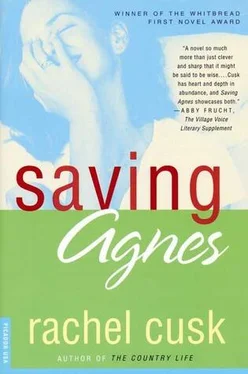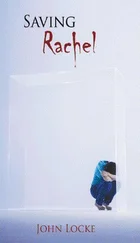In any case, what she did remember was that they had paused on the edge of the pavement to cross the busy road, and there, in a grey and unremarkable town-centre, watching for gaps in the traffic, she had suddenly felt her mind disengage and float away from it all. It was most unexpected. She had become frightened, sensing that something irrevocable had taken place, and had forced herself to speak in an attempt to recover her sense of there-ness.
‘I don’t feel as if I’m here,’ she had said to Christine Poole; and she remembered very clearly what had happened next. First of all, she realised her voice sounded distant, as if she were listening instead of speaking. Secondly, Christine had looked at her as if she were mad. These two events now seemed to have characterised much of her later life.
It was, then, with the onset of what she now termed ‘aloofness’ that she identified her parents’ regression. Two further incidents from that period stuck in her mind confirming her suspicions. The first was brief, and concerned her mother in much the same way as a snapshot taken unawares in a secret moment. Agnes was hunting for an old jumper which she suspected her mother might have secreted to the laundry basket, or worse, to the dustbin, and failing to locate it, had gone to attempt negotiations for its rescue. She had called her mother’s name, and, receiving no response, had begun searching one by one the rooms of their house. Agnes’s certainty that her quarry had such limited possibilities for escape did not, in her mind, make any matter for leniency. She had finally tracked her mother down to the small room off the kitchen where the laundry was done and had begun a furious address on the subject of her lost jumper.
Her mother, whose back had been turned, turned around to face her; not in the manner of one surprised, but with that same quality of aloofness which Agnes had begun recently to detect in herself. The picture she had, and which still came back to her so clearly, was that of her mother’s face in the moment before she had seemed to engage with the intrusion. She had looked dreamy, certainly; but there was also a split second in which Agnes was uncomfortably aware that her mother didn’t recognise her.
The second incident concerned her father, and was far spicier and more horrific that the first. During more or less the same period, Agnes’s father had begun to breed rabbits. He kept them in a shed beyond the vegetable patch and was unfailingly dutiful and tender in his ministrations to this nascent colony. Agnes early on became fascinated by these small creatures with their glowing eyes, and would often accompany her father to the hutches; although once she had seen a large rat lying nonchalantly along a beam in the shed, and had postponed her visits while dreams of its long, rubbery tail had haunted her sleep. One night, her father had trudged off by the light of a gas lantern to perform his caretaking duties, and had come rushing back a few minutes later in a state of great excitement.
‘It’s Ed McBain!’ he had cried. ‘She’s having babies!’
In his fondness for the creatures, her father had named them all after his favourite writers of detective stories; although the genre, unfortunately as it turned out, had not allowed for much variety in terms of gender.
Agnes alone felt compelled by this news to trail after her father in the rain out to the rabbit hutches, and the two of them settled themselves on overturned apple crates, with the lantern suspended overhead from the erstwhile perch of the hideous rat. At first there was little to see within the straw-lined hutch. The mother-to-be crouched at the far end, her body quivering. Agnes could see the red points of her eyes, which in the sepia light seemed to her to be infused with a strangely devilish intent.
‘Here they come!’ whispered her father excitedly. ‘Look — just there. Can you see it?’
Agnes looked in time to see a peculiarly pink-fleshed ball drop into the straw beside the mother rabbit. It squirmed, tiny and myopic.
‘It doesn’t have any fur!’ she cried.
‘It’s not supposed to,’ reassured her father. ‘That comes later. Look, there’s another one.’
The tiny flesh-balls were dropping every few minutes into the straw, where they began to move and unfurl pinkly like foetal fists. Agnes and her father sat in wondering silence, while the gas lamp hissed above them and the smell of straw suffused their nostrils with its dust. Agnes knew there was a miracle at hand.
‘What’s she doing now, Dad?’ she asked.
The rabbit had, apparently, finished her labours and was snuffling about the new-born bundles with her whiskered snout.
‘I think she’s cleaning them,’ her father replied.
The rabbit looked up as he spoke. She seemed disconcertingly to be staring at them. Agnes felt strangely uncomfortable beneath her eyes. Then, as they watched, the rabbit turned back to her progeny and took one in her mouth.
‘Dad?’ said Agnes. ‘Dad?’
He did not reply. They sat there in silence as the tiny back legs disappeared into the rabbit’s mouth and — unmistakably! — she swallowed.
‘Oh my God,’ said Agnes, as the rabbit bent her head and took another bundle between her small teeth. The baby rabbit wriggled as it disappeared into the cavity. ‘Dad, we’ve got to do something! We have to do something!’
Neither of them looked at the other as the rabbit swallowed. She appeared to be growing fatter as they watched. She ate a third baby and a fourth. Her eyes grew dreamy.
‘Dad, why don’t you do something?’ Agnes cried. She stood up and faced her father as tears began to form in her eyes. Her father sat still, hunched disconsolately on his apple crate.
‘What can I do?’ he said. ‘It’s nature’s course.’
‘You can take her out of the hutch — you can stop her! Look, there’s only three left!’
Her father shrugged impotently.
‘She probably didn’t have the nutrients to support them,’ he said. He began to sound rather cross. ‘It happens sometimes. It’s the survival of the fittest. We can’t interfere, Agnes.’
Agnes stared at him in disbelief. She was not afraid of his anger. She knew that he was wrong. Turning back to the hutch, she saw the last of the tiny rabbits disappear. Tears began pouring down her cheeks. She felt sick. The mother sat sluggishly in the hutch, her belly inflated and obscene. Agnes couldn’t believe that her father — an adult, a maker of decisions, a protector and punisher — had been so weak. She heard him stand up behind her and she turned around. His face was ashen. Then before she could say a word, he bolted out of the shed and into the garden, from where she could hear the sound of retching.
‘Who’s your best friend?’ Agnes asked her mother.
They were in the car on a rainy Monday morning, on the way to school. Agnes’s knees, which were blue and bony, protruded from beneath the hem of her darker blue skirt. She thought there would never be anything other than this: driven through the rain, her skirt too short, school waiting like a fate worse than death.
‘Your father,’ said her mother, changing gear. ‘Daddy is my best friend.’
‘Oh, Mum! He doesn’t count.’ Agnes felt wounded. No one ever took her questions seriously. ‘Who’s your real best friend?’
Like most people, Agnes had once toyed with the idea of ending her life before it had really begun, and at times it struck her how much subsequent failure she might have saved herself had she but been able to count teenage suicide as one of her early successes.
Her plans for ending it all had progressed to a respectably advanced stage, but what surprised her now was not so much her failure to bring them to a triumphant, albeit fatal, fruition, as the fearlessness with which, faced by certain of life’s problems, she had lighted on self-slaughter as the most effective means of solving them. This was perhaps the fault of nothing but the mere thirteen or so years which she had by then accrued; an interlude brief enough still to qualify as a trial period, a sort of fourteen-day satisfaction clause during which time commitments could be reneged upon and life handed back unsoiled.
Читать дальше












